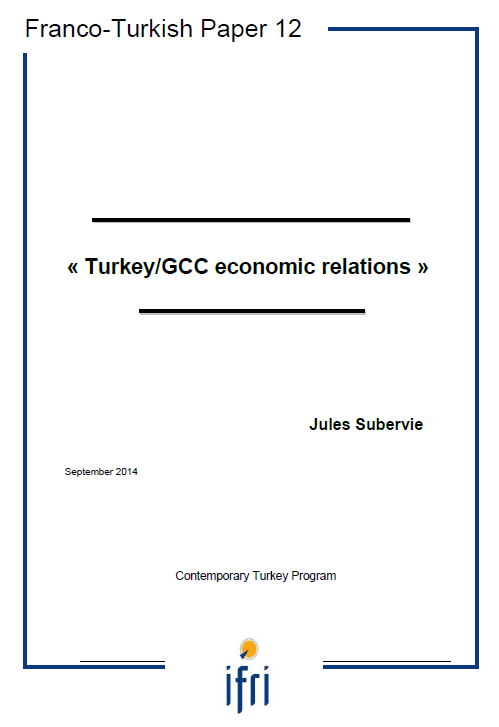Turkey/GCC Economic Relations

Developing economic relations with GCC countries has become a consistent objective of the Turkish government since the coming in power of AKP. They have been successful in rallying part of the Turkish business community to this objective, thus building an internal social consensus towards opening to the Gulf.
Being aware of the economic successes of GCC countries and of its own economic weaknesses, Turkey has thus persistently worked on developing exchanges with over the last decade – starting with the signing of an Economic Cooperation Framework Agreement in 2005. Bilateral and multilateral meetings are being regularly held in order to foster rapprochement and sustain the momentum.
As a result, Turkey / GCC exchanges have steadily increased in a win-win dynamic:
- Turkey crucially depends on the GCC to provide energy and foreign investment. The so-called “Turkish model”, combining social Muslim values, democracy and market economy, has gained attention in the region, attracting more and more tourists from the Gulf.
- GCC countries, experiencing the global economic crisis and a food crisis in 2007- 2008, have been drawn to invest in several agricultural projects in Turkey, to reach for arable land and ensure new food supply. Some also consider investing in the energy sector, one with a strong growth in Turkey.
- For Turkey, economic relations are also a tool to achieve the “zero-problem with neighbours” foreign policy objective.
Yet several variables cast a shadow on future cooperation between Turkey and GCC countries. Negotiation for a FTA started in 2005. They have been lagging behind and appear difficult to finalize in the current environment.
- At domestic level, Turkey’s economic environment is becoming shaky (impact of recession in the EU and conflicts in the Middle East, strong depreciation of the lira, corruption scandals affecting the government’s credibility, protests against Prime Minister Recep Tayyip Erdoğan).
- At regional level, some of Turkey’s recent foreign policy stances have negatively impacted relations with the GCC. The corruption scandals also revealed Turkey’s ambiguous treatment of Iran, who seems to have become a major economic target for AKP.
- Under such circumstances, Turkey’s constant efforts to position itself as a pivot between energy producing and consuming countries notably depend on the upgrading of its relations with GCC countries.

Available in:
Regions and themes
ISBN / ISSN
Share
Download the full analysis
This page contains only a summary of our work. If you would like to have access to all the information from our research on the subject, you can download the full version in PDF format.
Turkey/GCC Economic Relations
Related centers and programs
Discover our other research centers and programsFind out more
Discover all our analyses
RAMSES 2025. Between Powers and Powerlessness
Never before have there been so many powers able to upset the international balance of power, and never before have the dominant powers seemed so powerless to counter the fragmentation of the world.
Out of Thin Air but More than a Mirage: The Politics of Saudi Arabia's Nascent Music Industry
This study critically examines Saudi Arabia’s nascent music industry, which is promoted as a key element of Vision 2030, Crown Prince Mohammed bin Salman’s strategic framework to diversify the kingdom’s economy. It explores how state-led investments in music and entertainment intersect with authoritarian governance. The author neither dismisses these investments as conspicuous spending nor reproduces an alarmist narrative of impending cultural imperialism. The article takes a political sociology approach to understand how Saudi entertainment plans consolidate domestic power and reshape regional cultural landscapes.
Hostage diplomacy of the Islamic Republic of Iran. The case of Europeans detained in Iran
The so-called hostage diplomacy of the Islamic Republic of Iran refers to a political and diplomatic strategy in which Tehran uses the detention of Western nationals, dual citizens, or Iranian citizens residing in Europe, Australia, or the United States as leverage in diplomatic negotiations. This practice aims to exert pressure to secure political, economic, or diplomatic concessions as part of Tehran’s asymmetric response strategy. Hostage diplomacy remains a controversial yet effective tool from the perspective of the Islamic Republic of Iran, given its context of economic sanctions and diplomatic isolation.
Is the Republican People’s Party (CHP) Rising from the Ashes?
The victory of the CHP [Cumhuriyet Halk Partisi, Republican People’s Party] in the Turkish municipal elections of March 2024 firmly established it as the leading party of opposition to the Islamic-conservative AKP [Adalet ve Kalkınma Partisi, Justice and Development Party], which has been in power since 2002.







